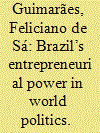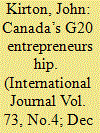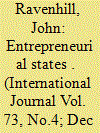|
|
|
Sort Order |
|
|
|
Items / Page
|
|
|
|
|
|
|
| Srl | Item |
| 1 |
ID:
163125


|
|
|
|
|
| Summary/Abstract |
In this paper, we apply the concept of entrepreneurial powers to analyze Brazil’s participation and influence in international crises. Following Ravenhill (this journal issue), we consider three dimensions of entrepreneurship: (a) the intention to convince others according to an actor’s interests; (b) the use of skilful politicians and bureaucracies to persuade partners; and (c) a proactive foreign policy that “sells” its position regarding the issues at stake. We argue that two other factors should be considered for a more encompassing view of entrepreneurial powers. First, the position of the involved great power on the crisis or in its negotiation. Second, that regional politics matter to entrepreneurial powers. We develop our argument using two case studies of success and failure respectively: the 1995 Cenepa War between Peru and Ecuador mediated by Brazil, and the 2010 Iranian nuclear deal sponsored by Brazil and Turkey.
|
|
|
|
|
|
|
|
|
|
|
|
|
|
|
|
| 2 |
ID:
163127


|
|
|
|
|
| Summary/Abstract |
Canada has been the successful entrepreneurial conceiver, co-creator, and normative and policy shaper of the G20 since the start. Under Paul Martin, Canada invented the concept and mission of the G20, co-creating it as a finance ministerial forum in 1999. Under Stephen Harper, Canada supported its elevation to summit in 2008, hosted it in 2010, and led important policy outcomes. Under Justin Trudeau, Canada further fostered the G20’s institutions, principles, and programs. Despite several entrepreneurial failures, Canada's lead was followed by established and rising members to make its G20 entrepreneurship succeed. Canada’s entrepreneurship was driven by its relative invulnerability to global shocks, its second-tier institutional position in the Bretton Woods institutions, and its rising relative capabilities. Canada’s three leaders brought strong domestic political control; continuity; expertise in business, economics, and finance; and mass public support. Canada was also a well-connected member of a G20 club at the hub of a global network.
|
|
|
|
|
|
|
|
|
|
|
|
|
|
|
|
| 3 |
ID:
163124


|
|
|
|
|
| Summary/Abstract |
The emergence of newly prominent participants (NPPs) in global governance has led to a revival of scholarly interest in the concept of middle powers. Because NPPs do not share the characteristics of “classical” middle powers, analysts have attempted to salvage the concept by adding various qualifiers. In doing so, they have further reduced its analytical utility. The concept of “entrepreneurial” states extracts the valuable components of the literature on middle powers while avoiding the problems arising from the conflation of two elements of behaviour—strategic and purposive. Entrepreneurial states are countries that seek to gain the support of others in pursuit of their perceived interests in the international system. They may be supporters of the current system, or seek to change it fundamentally. We investigate what attributes are necessary for states to behave in an entrepreneurial manner through studies of both successful and failed attempts at policy entrepreneurship.
|
|
|
|
|
|
|
|
|
|
|
|
|
|
|
|
| 4 |
ID:
163130


|
|
|
|
|
| Summary/Abstract |
War is antithetical to development. Development, for most mainstream observers, means economic growth, or at least stability, and an increasing quality of life for all, and it cannot exist in a state of war. Yet official development assistance (ODA), one of the primary mechanisms by which many governments and civil society organizations attempt to achieve development in impoverished economies, has a history rooted in war. This paper will explore how the Second World War and its aftermath influenced the creation of Canadian ODA and international development NGOs. While Canada's aid history is most commonly associated with the Canadian International Development Agency, examining this earlier period helps contextualize current debates about the securitization of aid and its harmonization with other aspects of Canadian foreign policy. Using the Unitarian Service Committee (USC) Canada as a case study, this paper will also track its transition from a postwar humanitarian relief agency to a mainstream international development NGO. For Canadian ODA and civil society organizations, the Second World War shaped the legacy of the postwar aid regime and created lasting consequences for its operation.
|
|
|
|
|
|
|
|
|
|
|
|
|
|
|
|
| 5 |
ID:
163126


|
|
|
|
|
| Summary/Abstract |
This article argues that the concept of entrepreneurial state is useful for analyzing Mexican foreign policy during recent decades. It argues that Mexico has behaved as an entrepreneurial state, following a limited foreign policy agenda to address national priorities, with important restrictions in terms of resources and agency, but seeking to obtain international recognition as a relevant global player that has influence on world affairs. This entrepreneurial behaviour is analyzed in Mexico's participation in international organizations (UN) and negotiations (climate change), mini-lateral mechanisms (MIKTA), and regional affairs (Central and Latin America). These cases show that, due to its limited capacities and agency, but its desire to become a relevant regional and global player to advance its national interest, Mexico has created coalitions with like-minded countries, pursued limited but domestically relevant global objectives, and invested its scarce foreign policy resources in an entrepreneurial manner.
|
|
|
|
|
|
|
|
|
|
|
|
|
|
|
|
| 6 |
ID:
163128


|
|
|
|
|
| Summary/Abstract |
Qatar and the United Arab Emirates (UAE) have become crucial players in the Middle East North Africa regional order. Few would have expected such a transformation even 20 years ago. This paper examines the constitution of Qatari and Emirati power. It demonstrates how understanding the entrepreneurial power of states is central to explanations of growth, strength, and position in regional and global orders. The analysis argues that the entrepreneurial powerhood of Qatar and the UAE is constituted by their development narrative and pursuit of status, which is facilitated by their material capabilities and their governance style characterized by flexible autocracy.
|
|
|
|
|
|
|
|
|
|
|
|
|
|
|
|
|
|
|
|
|